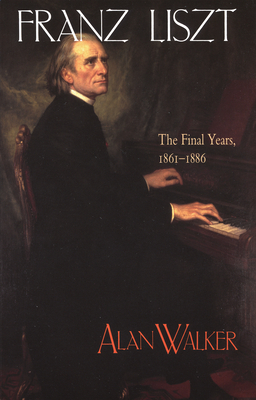


The third volume in Alan Walker's magisterial biography of Franz Liszt.
You can't help but keep turning the pages, wondering how it will all turn out: and Walker's accumulated readings of Liszt's music have to be taken seriously indeed.--D. Kern Holoman, New York Review of Books
A conscientious scholar passionate about his subject. Mr. Walker makes the man and his age come to life. These three volumes will be the definitive work to which all subsequent Liszt biographies will aspire.--Harold C. Schonberg, Wall Street Journal
What distinguishes Walker from Liszt's dozens of earlier biographers is that he is equally strong on the music and the life. A formidable musicologist with a lively polemical style, he discusses the composer's works with greater understanding and clarity than any previous biographer. And whereas many have recycled the same erroneous, often damaging information, Walker has relied on his own prodigious, globe-trotting research, a project spanning twenty-five years. The result is a textured portrait of Liszt and his times without rival.--Elliot Ravetz, Time
The prose is so lively that the reader is often swept along by the narrative.... This three-part work... is now the definitive work on Liszt in English and belongs in all music collections.--Library Journal

The second volume in Alan Walker's magisterial biography of Franz Liszt.
You can't help but keep turning the pages, wondering how it will all turn out: and Walker's accumulated readings of Liszt's music have to be taken seriously indeed.--D. Kern Holoman, New York Review of Books
A conscientious scholar passionate about his subject. Mr. Walker makes the man and his age come to life. These three volumes will be the definitive work to which all subsequent Liszt biographies will aspire.--Harold C. Schonberg, Wall Street Journal
What distinguishes Walker from Liszt's dozens of earlier biographers is that he is equally strong on the music and the life. A formidable musicologist with a lively polemical style, he discusses the composer's works with greater understanding and clarity than any previous biographer. And whereas many have recycled the same erroneous, often damaging information, Walker has relied on his own prodigious, globe-trotting research, a project spanning twenty-five years. The result is a textured portrait of Liszt and his times without rival.--Elliot Ravetz, Time
The prose is so lively that the reader is often swept along by the narrative. . . . This three-part work . . . is now the definitive work on Liszt in English and belongs in all music collections.--Library Journal

The third volume in Alan Walker's magisterial biography of Franz Liszt.
You can't help but keep turning the pages, wondering how it will all turn out: and Walker's accumulated readings of Liszt's music have to be taken seriously indeed.--D. Kern Holoman, New York Review of Books
A conscientious scholar passionate about his subject. Mr. Walker makes the man and his age come to life. These three volumes will be the definitive work to which all subsequent Liszt biographies will aspire.--Harold C. Schonberg, Wall Street Journal
What distinguishes Walker from Liszt's dozens of earlier biographers is that he is equally strong on the music and the life. A formidable musicologist with a lively polemical style, he discusses the composer's works with greater understanding and clarity than any previous biographer. And whereas many have recycled the same erroneous, often damaging information, Walker has relied on his own prodigious, globe-trotting research, a project spanning twenty-five years. The result is a textured portrait of Liszt and his times without rival.--Elliot Ravetz, Time
The prose is so lively that the reader is often swept along by the narrative. . . . This three-part work . . . is now the definitive work on Liszt in English and belongs in all music collections.--Library Journal

A New York Times Book Review Editors' Choice. The Sunday Times (UK) Classical Music Book of 2018 and one of The Economist's Best Books of 2018.
A magisterial portrait. --Corinna da Fonseca-Wollheim, The New York Times Book Review


If only I do not die here. After falling ill during a visit to Bayreuth, Franz Liszt uttered this melancholy refrain throughout his final days, which were spent in rented rooms in a house opposite Wahnfried, the home of his daughter Cosima and his deceased son-in-law Richard Wagner. Attended by incompetent doctors and ignored and treated coldly by his daughter, the great composer endured needless pain and indignity, according to a knowledgeable eyewitness. Lina Schmalhausen, his student, caregiver, and close companion, recorded in her diary a graphic description of her teacher's illness and death. Alan Walker here presents this never-before-published account of Liszt's demise in the summer of 1886.Walker, whose three-volume biography of Liszt was praised as without rival by Time, states that no one who is remotely interested in the life and work of Franz Liszt can remain unaffected by the diary. Schmalhausen's tale of neglect, family indifference, and medical malpractice was considered so explosive at the time of its writing that it was kept from public view. The twenty-two-year-old Schmalhausen was regarded with suspicion by many in the composer's inner circle, as well as by other confidants, and a sanitized and inaccurate depiction of Liszt's death made its way into the history books. For this volume, Walker has overseen the translation and thoroughly annotated the eighty-one-page handwritten diary, and added a selection of illustrations. A prologue contains important background information on Liszt himself and on Lina Schmalhausen's diary. An epilogue discusses the funeral and ensuing controversies over disposition of the composer's remains.


In a series of lively essays that tell us much not only about the phenomenon that was Franz Liszt but also about the musical and cultural life of nineteenth-century Europe, Alan Walker muses on aspects of Liszt's life and work that he was unable to explore in his acclaimed three-volume biography of the great composer and pianist. Topics include Liszt's contributions to the Lied, the lifelong impact of his encounter with Beethoven, his influence on students who became famous in their own right, his accomplishments in transcribing and editing the works of other composers, and his innovative piano technique. One chapter is devoted to the Sonata in B Minor, perhaps Liszt's single most celebrated composition.
Walker draws heavily on Liszt's astonishingly large personal correspondence with other composers, critics, pianists, and prominent public figures. All the essays reveal Walker's broad and deep knowledge of Liszt and Romantic music generally and, in some cases, his impatience with contemporary performance practice.






Introducing 7-by-many letter puzzles. 100 puzzles that challenge you to make as many words as you can using seven different letters. Each letter can be used as many times as necessary, or not at all, as long as the letter in the middle of the puzzle is used at least once. Words must be at least five letters long. At least one word can be made that uses all seven letters. Will appeal to fans of the New York Times Spelling Bee puzzle.
Each puzzle has targets for how many words you find. Good, Better and Best can be reached with well-known words. Two higher target levels require some more obscure words. You decide which target to aim for. All possible words are listed in the Solution section.





